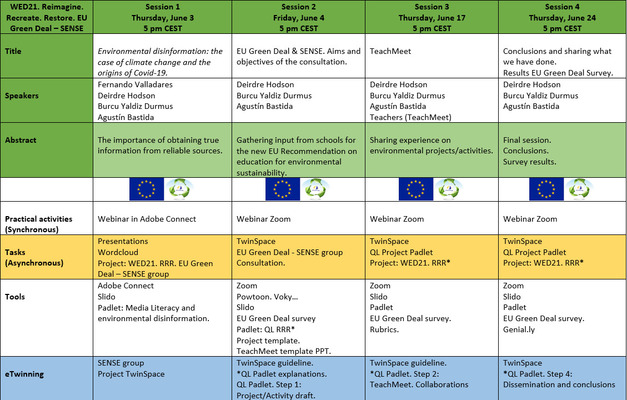Our project characteristics
Participant profile. Teachers, advisors, directors and any other school staff from any educational level or subject interested in environmental projects (SDGs) with or without students.
Target. The objective is to obtain information on the difficulties that exist in schools to carry out environmental activities. Any other relevant information that contributes to the development of environmental initiatives or related to the SDGs in schools. Green curriculum proposals. Sustainability competence among the other Key Competences. To collaborate with the European Commission for the Green Deal Recommendation. And finally to evaluate the final proposals from our role at school -teacher, manager, advisor...-.
Content. Media Literacy and Disinformation in Sustainability Education. Difficulties to develop SDGs or environmental activities at school. Curriculum and Key Competences. National Education Plans.
Methodology strategies and tools. Experts talks, collaborative work -PBL,Learning-Service,Inquiry...- in multinational teams, crosscurricular, interactive ICT tools, videoconferences, TeachMeets, survey and rubrics.
Begins. The 3rd June with the Seminar Environmental Disinformation: the cases of climate change and the origins of Covid-19 by Fernando Valladares
Duration:
Stage 1. June - December. Only teachers
Stage 2. January - May 2022. In collaboration with students.
Administrators: Burcu Yaldız Durmuş and Agustín Bastida
-.-.-.-.-.-.-.-.-.-.-.-.-.-.-.-.-.-.-.-.-.-.-.-
PROGRAMME
This schedule has been changed due to the summer holidays. Sessions 3 and 4 will be done in september and october.
WORLD ENVIRONMENTAL DAY. REIMAGINE, RECREATE, RESTORE. EU Green Deal - SENSE group consultation.

Access to the Programme
PROGRAMME WED21.pdf
-.-.-.-.-.-.-.-.-.-.-.-.-.-.-.-.-.-.-.-.-.-.-.-
EU Green Deal – SENSE Group consultation
Global warming and loss of biodiversity are major challenges facing Europe and the world today. Through the Green Deal, the European Union is taking action to fight the climate crisis and work towards a greener and fairer society in a more sustainable Europe. Laws and policies are crucial but they are not enough, our everyday actions and choices also matter.
The EU’s Green Deal is a call for everyone to work together to improve the economy and society towards a paradigm shift and to learn to respect the boundaries of our planet. This will require us to rethink our way of life, our habits and actions to protect our planet for future generations.
Education and training are key in this process, helping develop the knowledge, skills and attitudes needed for this transition. Schools, universities and other education institutions are increasingly looking at how their pupils and students can learn about the environment in a dynamic hand-on way.
Although much is happening across Europe to address sustainability in education and training, more needs to be done. While people share a widespread concern for the environment, they are often more hesitant when it comes to taking action. Educational factors can contribute to this gap, including low levels of understanding of environmental issues as well as insufficient social, emotional and behavioural learning. Competences for sustainability should therefore be present in all educational systems. This will support and empower citizens to become critical thinkers, who are prepared to face the challenges of the future and build solutions which promote sustainability and social justice.
How will we consult?
The schools policy team are now preparing a public consultation to ask people and organisations for their views and ideas on what matters in education for environmental sustainability. This will consist of a survey and the possibility of submitting a position paper but we are also looking at different ways to consult - which is why we are in touch with the Sustainability Education Network Service eTwinning group (SENSE group).
In parallel we are also working on a study which will give voice to different educational agents, not only teachers, but students and PTA’s of all educational stages during two workshops, in April and June, through the community of teachers of the eTwinning featured group "Sustainability Education Network Service eTwinning (SENSE).